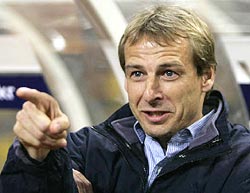|
|
| Help | |
| You are here: Rediff Home » India » Sports » Football »
Reuters >
Report |
|
| |||||||||||||||||||||||
|
| |||||||||||||||||||||||
It is a long way from northern Europe's frozen soccer pitches to southern California's surfer-filled beaches but Germany [Images] coach Juergen Klinsmann stays tuned to his homeland from half a world away.
Commuting 40,000 km each month, Klinsmann has revitalised Germany since taking over the faltering team six months ago and has turned the great distance between his United States home and German job to his advantage.
 Capitalising on technology advances, Klinsmann has no trouble reaching players, assistants and club trainers by e-mail or cell phone. He tracks German media reports on internet websites and watches Bundesliga matches on television.
Capitalising on technology advances, Klinsmann has no trouble reaching players, assistants and club trainers by e-mail or cell phone. He tracks German media reports on internet websites and watches Bundesliga matches on television.
"At the end of the day the only thing that matters is the quality of the work you deliver," Klinsmann said in an interview with Reuters in his adopted hometown of Huntington Beach, south of Los Angeles. "I see only advantages to this set-up."
A little jet lag, red eyes that come with rising before dawn to have more time on Europe's schedule, and high phone bills are negligible drawbacks compared to the welcome side effect that nine time zones and 9,000 km provide a barrier to Germany's fickle media.
"The world has changed with modern communications so it doesn't matter where you are physically," said Klinsmann who flies back to Germany at least twice a month.
"Wherever in the world I am, I can stay hooked up to Germany. What difference does it make if I phone a player from California or Frankfurt?"
Klinsmann -- whose rejuvenated team have impressed with five wins, a draw and a loss since he took over in August -- has silenced most domestic sceptics of his long-distance commuting.
A few die-hard critics such as Schalke 04 commercial manager Rudi Assauer still argue he should be in Germany all the time, observing players and talking in person with Bundesliga coaches.
"I have no problem with that criticism and respect those who have differing views," Klinsmann said. "But at the end of the day I have to decide what's best. And in my view this set-up benefits the team."
UNCHARTED WATERS
Klinsmann, 40, admits it was a move into uncharted waters for three-times World Cup winners Germany, even though other coaches including Greece's Otto Rehhagel and Cameroon's former trainer Winnie Schaefer commuted long distances from Germany. Japan [Images] coach Zico flies to and from his native Brazil [Images].
"There are a number of other trainers who've been doing this successfully before me so the model isn't exactly something new," Klinsmann said. "What ultimately matters is the quality of the work, or in other words: results."
In between sips of a latte macchiato at a cafe, the former Germany striker conceded he had been prepared to rethink the long-distance commute if it turned out it was causing problems.
"The plan was to examine whether it was working well or working at all," he said after taking a quick phone call from team manager Oliver Bierhof.
"It was my hope that it would work out as well as it has in these six months. It's an advantage to keep a bit of distance. It's helping me keep a clear view of the bigger international picture."
Klinsmann has also avoided the treacherous embraces and menacing scrutiny of Germany's demanding media, which viciously turned on predecessor Rudi Voeller just two years after idolising him for leading the team to the 2002 World Cup final.
"It's important that you not allow yourself to be eaten up in the daily media coverage," he said, savouring January's bright California sunshine and temperatures of 27 degrees Celsius.
"You need to keep a buffer zone. I don't think a national trainer should make comments on everyday developments in the Bundesliga.
"Naturally I follow what's going on but I don't want to interfere and the distance to Germany makes it easier to filter what's important from what's not important."
CONFERENCE CALLS
Rising at 5:30 every morning, Klinsmann switches on his computer in his home office. Sometimes when he feels cramped there he takes his laptop to work on it at a local cafe.
He holds conference calls with assistants in Germany every other day and spends 11-hour flights tapping away on his laptop.
Klinsmann, who as a player won the 1990 World Cup and the 1996 European championship with Germany, cherishes his anonymous lifestyle in California, his home for six years, and says it is better for his family.
"It's quite pleasant," said Klinsmann, who also played for Bayern Munich, Inter Milan, Monaco and Tottenham Hotspur. He stays fit by training with a local amateur soccer team.
Whether Klinsmann, who believes Germany can win a fourth World Cup in 2006, will stay beyond the tournament Germany is hosting remains an open question to everyone -- including himself.
"I'm not dependent on long-term job security," he said. "We'll sit down after the World Cup and analyse what's worked and what hasn't. Hopefully we'll have had success. Then we've got time to decide what's next.
"If we don't succeed, the issue will resolve itself. But I really do sense it's going to go well for us."
| © Copyright 2008 Reuters Limited. All rights reserved. Republication or redistribution of Reuters content, including by framing or similar means, is expressly prohibited without the prior written consent of Reuters. Reuters shall not be liable for any errors or delays in the content, or for any actions taken in reliance thereon. |
|
|
| © 2008 Rediff.com India Limited. All Rights Reserved. Disclaimer | Feedback |